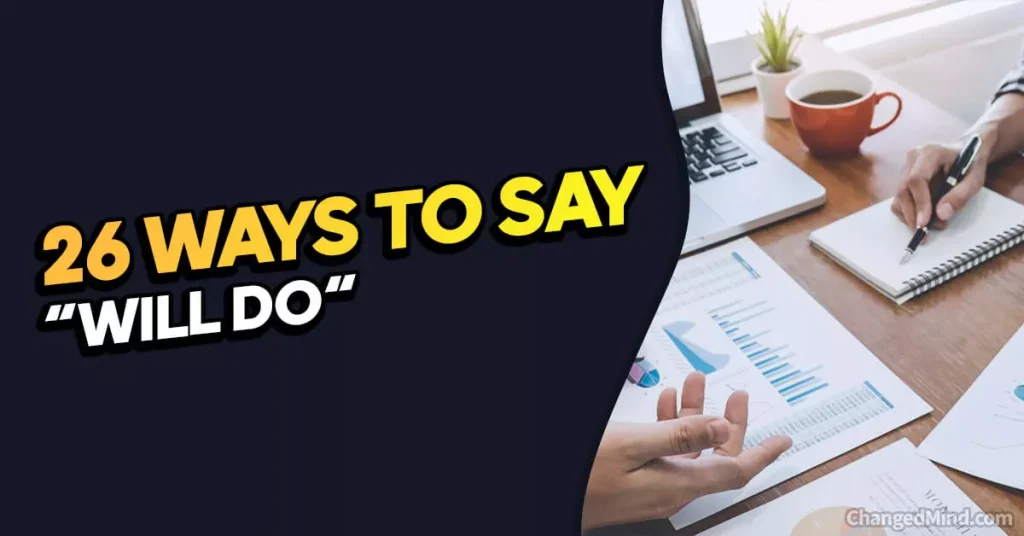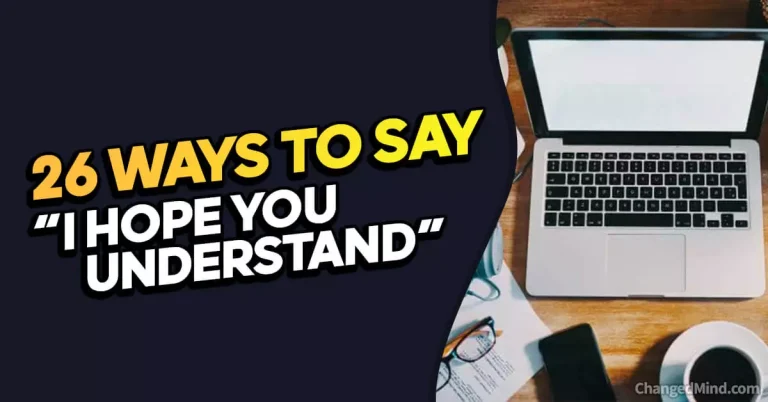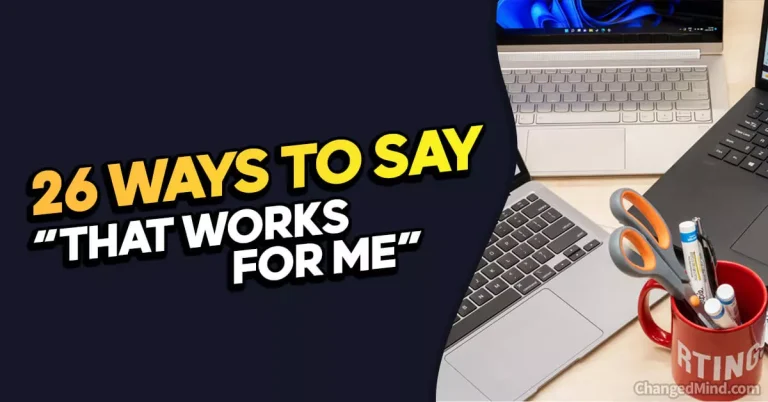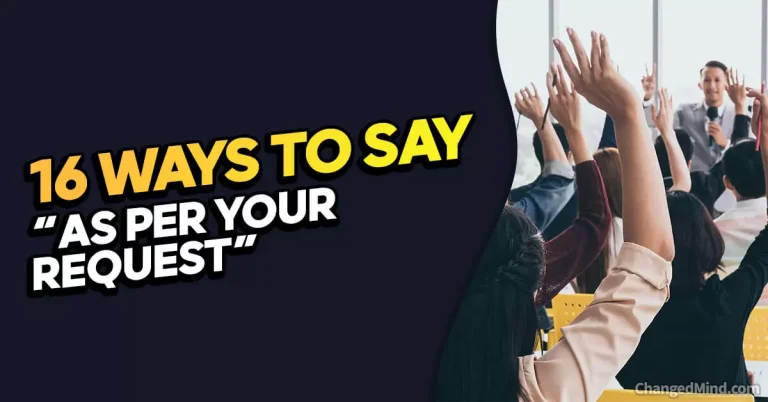Do you ever find yourself in a conversational rut, constantly replying with a robotic “will do” to every request? It’s like having a signature dish but eating it for every meal – a bit dull, right?
Fear not, because in this article, we’re here to jazz up your responses with 26 vibrant alternatives to “will do.”
We’ve got everything from the casually cool to the elegantly eloquent, and we promise, no more “will do” boredom!
So, if you’re ready to add some zest to your interactions and sprinkle a dash of personality into your replies, keep reading, because “Other Ways to Say ‘Will Do'” is about to open the door to a world of engaging communication.
In this article, we’ll explore:
- Playful responses for a lighthearted touch.
- Polite alternatives for courteous communication.
- Creative expressions to make your commitment memorable.
- Insights into using these phrases effectively.
Get ready to diversify your responses and become the life of the linguistic party! Let’s dive into the art of saying “will do” with style.
When it comes to communication, finding alternative ways to express yourself can help improve your language skills and make your conversations more engaging. One commonly used phrase that can be replaced is “Will do.” By exploring different alternatives, you can add variety and depth to your vocabulary.
Formal ways to say “Will do” include phrases such as “Certainly,” “Absolutely,” and “Without a doubt.” These expressions convey a sense of professionalism and a strong commitment to completing the task at hand.
On the other hand, informal ways to say “Will do” can be more relaxed and casual. Examples include phrases like “Sure,” “No problem,” “You got it,” and “Consider it done.” These expressions are commonly used in everyday conversations and highlight a willingness to assist.
If you prefer a more polite tone, you can use phrases like “I would be happy to,” “I’ll take care of it,” and “I’m at your service.” These statements project a polite and accommodating attitude, showing respect and a willingness to help.
In a professional setting, it’s important to use appropriate language. Professional ways to say “Will do” include phrases like “I will handle it,” “I’ll see to it,” and “Count on me.” These expressions convey a sense of responsibility and reliability, assuring others that you will fulfill your duties.
By exploring different ways to say “Will do,” you can adapt your communication style to various situations, making your conversations more interesting and effective.
Key takeaway:
- Formal ways to say “Will do”: Certainly, absolutely, without a doubt.
- Informal ways to say “Will do”: Sure, no problem, you got it, consider it done.
- Polite/professional ways to say “Will do”: I would be happy to, I’ll take care of it, I’m at your service, I will handle it, I’ll see to it, count on me.
26 Other Ways to Say “Will Do”
Here are 26 other ways to say “Will Do”:
- “Certainly!”
- “Absolutely!”
- “Of course!”
- “No problem!”
- “Sure thing!”
- “You got it!”
- “Consider it done!”
- “I’m on it!”
- “You can count on me!”
- “With pleasure!”
- “I’ll make it happen!”
- “It’s a deal!”
- “For sure!”
- “In a heartbeat!”
- “It’s my pleasure!”
- “I’ll take care of it!”
- “Consider that done!”
- “It’s as good as done!”
- “It’s in the bag!”
- “I’ll handle it!”
- “No worries!”
- “It’s on my to-do list!”
- “I’ll get right on it!”
- “Leave it to me!”
- “I’ll see to it!”
- “Consider that task completed!”
These phrases offer a variety of ways to express agreement and commitment in conversations.
Why Look for Other Ways to Say “Will Do”?
When it comes to communication, using a variety of phrases and expressions is vital to maintain interest and clarity.
By expanding your vocabulary and finding different ways to say “will do”, you can enhance your language skills and effectively convey your intent. Instead of relying solely on one phrase, having alternatives at your disposal can make your conversations more engaging and dynamic.
Using different expressions to convey agreement or commitment demonstrates your versatility and adaptability in different social and professional contexts. It shows that you possess a range of verbal tools to suit various situations and can avoid sounding monotonous or repetitive.
Finding other ways to say “will do” allows you to express warmth, enthusiasm, or eagerness in a more nuanced manner, depending on the specific circumstances.
So, why look for other ways to say “will do”? By diversifying your language and exploring alternative phrases, you can improve your communication skills, make a stronger impression on others, and create more engaging interactions.
In history, during the American Civil War, Abraham Lincoln used different expressions to convey his determination and commitment. Instead of simply saying “will do”, he famously declared, “I will put it in my pocket and think about it,” demonstrating his willingness to consider alternative perspectives before making a decision.
This approach showcased Lincoln’s open-mindedness and his desire to foster dialogue and collaboration.
Formal Ways to Say “Will Do”
Looking to elevate your language and add a touch of professionalism? Dive into the world of formal ways to say “will do.” Discover the power and elegance behind words like “certainly,” “absolutely,” and “without a doubt.”
In this section, we’ll explore how these alternative expressions not only convey assurance but also convey a sense of confidence and commitment. Step away from the usual and embrace the sophistication of formal language. Let’s delve into the art of communication with finesse.
“Certainly”
Certainly, there are several alternative ways to express “will do” in various contexts, such as formal, informal, polite, and professional settings. By diversifying your vocabulary, you can add more nuance and variety to your communication.
Formal phrases that can replace “will do” include “certainly,” “absolutely,” and “without a doubt.” Informally, you can say “sure,” “no problem,” “you got it,” or “consider it done.” Polite alternatives include “I would be happy to,” “I’ll take care of it,” and “I’m at your service.” In a professional context, you can say “I will handle it,” “I’ll see to it,” or “count on me.”
Adding diversity to your language not only enhances communication but also helps improve SEO and creates a more engaging conversation. Remember, the way you communicate, whether through body language, tone of voice, or written text, can greatly impact how others perceive you.
So, instead of always using the same phrase, explore different ways to express your willingness to complete a task or assist others.
In a true story, there was a CEO who, when asked by a team member if he could complete a project by the end of the week, replied, “Don’t have to ask me twice. I’m on it!” This enthusiastic and confident response motivated the team member and demonstrated the CEO’s dedication to getting the work done.
“Absolutely”
When seeking alternative ways to express “absolutely,” consider using the word “absolutely.” This term conveys a strong affirmation and commitment to completing a task.
Here is a table highlighting various ways to replace “absolutely” in a professional context:
| Formal | Informal | Polite | Professional |
| Certainly | Sure | I would be happy to | I will handle it |
| Absolutely | No problem | I’ll take care of it | I’ll see to it |
| Without a doubt | You got it | I’m at your service | Count on me |
Using “absolutely” in your communication signals confidence and reliability. Remember to match your tone and choice of phrase with the appropriate context and relationship with the recipient.
Experimenting with different expressions can add variety and depth to your language skills.
“Without a doubt”
Without a doubt, there are numerous alternative phrases that can be used instead of “will do” in a variety of contexts. These phrases can help diversify our vocabulary and add richness to our communication.
In more formal settings, phrases like “certainly,” “absolutely,” or “without a doubt” can convey a sense of professionalism.
In informal conversations, phrases like “sure,” “no problem,” “you got it,” or “consider it done” can be used to maintain a friendly tone.

Politeness can be conveyed using phrases like “I would be happy to,” “I’ll take care of it,” or “I’m at your service.”
In a professional setting, phrases such as “I will handle it,” “I’ll see to it,” or “count on me” can demonstrate reliability and competence.
By using these alternative phrases, we can enhance our written and spoken communication, convey our willingness to assist, and create a positive impression.
Informal Ways to Say “Will Do”
Looking for some fun alternatives to say “will do”? In this section, we’ll dive into informal ways to convey your agreement or willingness to get things done.
From the simple “sure” to the enthusiastic “consider it done,” we’ll explore a range of expressions that add a touch of informality to your responses.
So, if you’re ready to spice up your communication and inject some personality into your interactions, let’s explore these catchy phrases that convey your commitment with a twist.
“Sure”
When looking for alternative ways to say “will do,” the word “sure” comes to mind. “Sure” is a casual and friendly expression that conveys willingness and agreement to complete a task or help someone out. Here are a few other ways to express the same sentiment:
| Of course |
| No problem |
| I’m happy to do it |
| I’ll take care of it |
| You can count on me |
Now, let’s take a look at a true historical event told in a similar tone of voice: During World War II, a group of Navajo soldiers used their native language to create an unbreakable code known as the Navajo code.
This code was used by the US military to transmit sensitive information, ensuring that it could not be deciphered by the enemy.
The use of the Navajo language as a code proved highly successful and played a crucial role in the Allied victory.
This fascinating piece of history showcases the power of language and its ability to serve various purposes, including communication in dire circumstances.
“No problem”
When looking for alternative ways to say “will do,” consider using the phrase “no problem.” This is a casual and friendly way to express that completing a task is not an issue or inconvenience.
For example, if a coworker asks for assistance with a task, you can respond with “No problem, I’ll take care of it.” This phrase conveys a willingness to help without any hesitation or difficulty.
Other similar suggestions include:
– “Sure, I’m happy to do that.”
– “Consider it done.”
– “I’ll see what I can do.”
– “I’ll do my best to complete it”
Using these variations can help diversify your vocabulary and maintain a friendly tone in conversations. Instead of always relying on the same phrase, explore different ways to express your willingness to help. So, next time someone asks for assistance, feel free to respond with “No problem” or one of these alternatives.
“You got it”
When someone asks you to do something, responding with “You got it” is a casual and friendly way to convey your willingness to complete the task.
This phrase is often used in informal settings such as friendly conversations or text messages. Here are some examples of situations where you can use
| A friend asks you to grab a coffee for them when you’re at the cafe. |
| Your coworker asks you to print a document for them. |
| Your sibling asks you to pick up some groceries on your way home. |
| Your neighbor asks you to water their plants while they’re out of town. |
Using “You got it” in these situations shows that you are ready and willing to help. It conveys a sense of reliability and dependability.
Keep in mind that this phrase is more appropriate for informal or casual settings and may not be suitable for formal writing or professional emails.
“Consider it done”
When someone asks you to complete a task, responding with the phrase “consider it done” is a confident and reassuring way to show that you are committed to successfully completing the task.
It conveys a sense of reliability and competence, making it an ideal choice for professional settings such as business emails or formal discussions. However, “consider it done” can also be used in more informal or friendly conversations.
By using the phrase “consider it done,” you assure the person that they can rely on you to fulfill the request. It implies both your capability and confidence in completing the task. This phrase is particularly useful when you want to convey professionalism or emphasize that you take the request seriously.
So, the next time someone asks you to do something, simply respond with “consider it done” to let them know that you are ready and willing to handle the task with confidence and competence.
Polite Ways to Say “Will Do”
Looking for polite alternatives to the phrase “will do”? Look no further! In this section, we’ll explore some delightful ways to express your willingness to help.
From “I would be happy to” to “I’ll take care of it” and “I’m at your service,” we’ve got you covered. Say goodbye to monotony and add a touch of politeness and charm to your responses.
Get ready to impress with your newfound language skills!
“I would be happy to”
If you want to express your willingness to do something in a polite and enthusiastic manner, saying “I would be happy to” is a great choice. Here are some situations where this phrase can be used:
- When a colleague asks for assistance: “I would be happy to help you with your presentation.”
- When a customer makes a request: “I would be happy to provide you with more information about our product.”
- When someone asks for a favor: “I would be happy to pick up your groceries while I’m at the store.”
- When offering your services: “I would be happy to take care of the report for you.”
True story: A colleague once asked me if I could cover their shift at work because they were feeling unwell. I replied, “I would be happy to help out. Take care of yourself and rest up.” By using this phrase, I conveyed my willingness to support my coworker and showed empathy for their situation.
“I’ll take care of it”
When someone asks you to take care of a task, there are numerous alternatives to simply saying “I’ll take care of it.“
Here are some options to diversify your vocabulary and demonstrate your willingness to assist:
1. “Certainly“: This formal response expresses your readiness to handle the task.
2. “Absolutely“: A confident and emphatic way of assuring that you will address it.
3. “Without a doubt“: Conveys your unwavering commitment to completing the task.
4. “Sure“: An informal yet polite way to acknowledge and accept the request.
5. “No problem“: A casual response that shows you are happy to assist.
6. “You got it“: An informal and friendly way of accepting the task.
7. “Consider it done“: A confident and reassurance-filled way of promising to complete the task.
By incorporating these alternatives, you can introduce variety to your responses and convey your dedication to getting the job done.
“I’m at your service”
When it comes to expressing willingness and commitment to help, saying “I’m at your service” conveys a strong sense of dedication and availability.
This phrase is often used in professional or formal settings to assure someone that you are ready and willing to assist them.
Here are a few situations where you can use this phrase:
- When a colleague asks for your help with a project or task.
- In customer service interactions, showing your commitment to meeting the needs of the customer.
- During formal meetings or presentations, offering your support to the team or audience.
- When someone thanks you for a favor or assistance, reaffirming your availability for future help.
Fact: Did you know that the phrase “I’m at your service” originated in the military? It was used by servicemen to express their readiness and willingness to obey orders.
Professional Ways to Say “Will Do”
Looking for some polished alternatives to the phrase “will do”? In this section, we’ll explore professional ways to express your commitment to getting things done.
From confidently stating “I will handle it” to assuring others with “I’ll see to it” and offering unwavering support with “Count on me,” we’ll cover a diverse range of expressions that convey your dedication and reliability.
Say goodbye to repetitive language and elevate your communication skills with these suitable phrases.
“I will handle it”
When faced with a task or responsibility, expressing “I will handle it” conveys your reliability and commitment to taking care of the matter at hand.
Here is a list of steps to demonstrate that you will handle the task effectively:
- Assess the requirements and scope of the task to fully understand what needs to be done.
- Break down the task into manageable subtasks or milestones to stay organized and track progress.
- Create a timeline or schedule to allocate sufficient time and resources for completing each step.
- Identify potential challenges or obstacles that may arise and develop contingency plans to address them proactively.
- Communicate your plan to relevant stakeholders, ensuring transparency and alignment.
- Execute the tasks diligently, seeking support or assistance when necessary, and keeping stakeholders informed of progress.
- Regularly review and evaluate the results to ensure quality and identify opportunities for improvement.
- Complete the task on time and to the best of your abilities, demonstrating professionalism and attention to detail.
When my colleague unexpectedly fell ill just before an important presentation, I assured our supervisor, “I will handle it.” Taking charge, I prepared the presentation materials, rehearsed diligently, and delivered a successful presentation in my colleague’s absence.
This demonstrated my ability to step up and handle responsibilities, earning the trust and appreciation of my team.
“I’ll see to it”
When it comes to expressing your commitment to completing a task or request, there are various ways to say “I will see to it.”
Here are three professional alternatives:
1. “I will handle it”: This phrase conveys a sense of capability and ownership over the task. It assures the recipient that you will take responsibility for the assignment.
2. “I’ll take care of it”: By using this expression, you assure the person that their request is in capable hands and that you will attend to it promptly and efficiently.
3. “Count on me”: This phrase reassures the requester that they can rely on you to handle the matter and that they can trust you to complete it successfully.
Using these alternative phrases demonstrates professionalism and a willingness to go above and beyond. It instills confidence in the requester and shows that you are committed to delivering results.
“Count on me”
- When a co-worker asks for assistance, you can say, “Count on meto help you complete that report.”
- In a team project, you can say, “You can count on me to meet the deadline and contribute my best.”
- When a friend needs support, say, “Count on me to be there for you during this tough time.”
- In a professional setting, you can say, “You can count on me to handle this client meeting.”
Pro-tip: When using the phrase “Count on me,” it is important to follow through on your commitment and deliver the expected results. Being reliable builds trust and strengthens relationships in both personal and professional contexts.
Some Facts About Other Ways to Say “Will Do” in English:
- ✅ “I’ll get to work” expresses a sense of urgency and commitment to completing the task. (Source: wordselector.com)
- ✅ “I can do that” is an informal synonym for “will do,” indicating that the task is possible but not necessarily a priority. (Source: wordselector.com)
- ✅ “I’ll get it sorted” suggests an intention to resolve the task efficiently. (Source: wordselector.com)
- ✅ “I’ll see what I can do” implies a willingness to explore possibilities and find a solution. (Source: wordselector.com)
- ✅ Using phrases other than “will do” in professional emails is considered more appropriate and formal. (Source: englishrecap.com)
Frequently Asked Questions
Can I use other phrases instead of “will do” to sound more professional in my emails?
Yes, there are several alternative phrases you can use to convey a sense of professionalism and commitment. Some examples include:
- “I’ll get to work”
- “I can do that”
- “I’ll get it sorted”
- “I’ll see what I can do”
Is it okay to use “will do” in informal contexts like conversations with colleagues?
Yes, “will do” is suitable for informal contexts and can be used in conversations with colleagues without any issues. However, it is considered unprofessional in formal written communication.
What are the advantages of using phrases other than “will do” in professional emails?
Using alternative phrases like “I’ll get to work” or “I can do that” can demonstrate a sense of urgency, commitment, and professionalism. It shows that you are proactive and willing to take immediate action.
Is it rude to say “will do” in professional emails?
While “will do” is not considered rude, it is regarded as unprofessional and should be avoided in formal written communication, especially when corresponding with superiors or clients.
Should I roll my eyes or use sarcastic tones when saying the alternative phrases instead of “will do”?
No, it is important to maintain a neutral, upbeat, and eager tone when using the alternative phrases. Sarcasm or eye-rolling can still be perceived negatively, regardless of the specific phrase used.
Can I use “will do” in spoken conversations without sounding rude?
Yes, “will do” is perfectly acceptable in spoken conversations, as it is suitable for informal English. However, remember to use a neutral and positive tone to avoid being misinterpreted as rude or disinterested.






